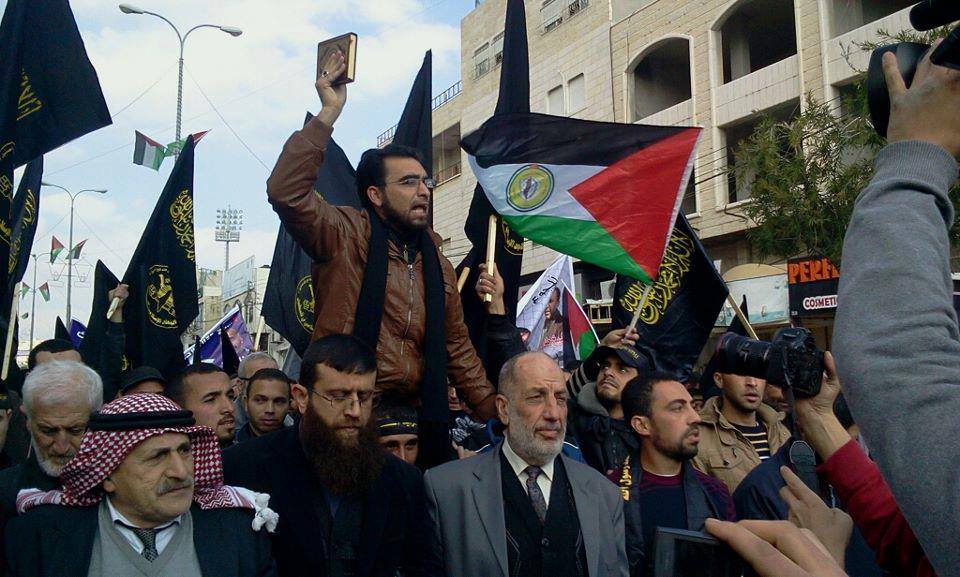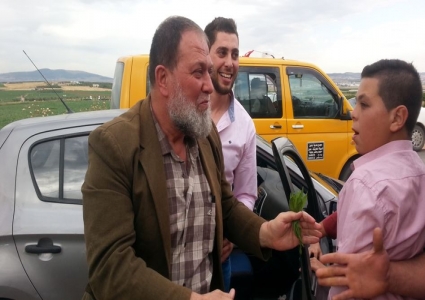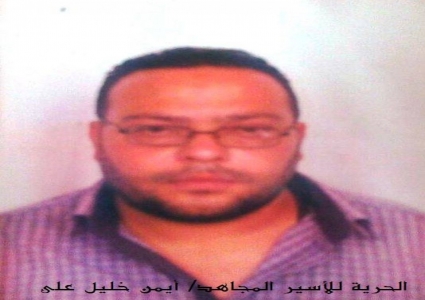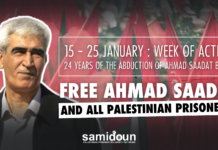Four Palestinian prisoners are continuing their hunger strike against administrative detention: Anas Shahid and Ahmad Abu Fara have refused food for 20 days and Majd Abu Shamla and Hasan Rubayah have been on strike for ten days, all demanding their release from Israeli imprisonment without charge or trial.
Abu Shamla and Rubayah are being held in isolation in the Negev desert prison; Rubayah is also held there. Abu Shamla has been imprisoned, held without charge or trial since 27 January. Rubayah was has been detained by the Israeli occupation since 31 March. Meanwhile, Shadid and Abu Fara were transferred to isolation in the Nitzan prison, which is usually reserved for Israeli criminal prisoners and is near the Ramle area, on 10 October.
The health of all four hunger strikers is deteriorating and they are experiencing fatigue, weakness and other symptoms of their consumption of only water and salt.
 They are among nearly 750 Palestinians held without charge or trial under administrative detention. On Thursday, 13 October, Thaer Halahleh, former long-term hunger striker, was released from administrative detention without charge or trial after 26 months of imprisonment; his most recent confinement came after further years of imprisonment without charge. He has spent over 11 years in Israeli prison, most under administrative detention. During his previous period of administrative detention, Halahleh engaged in several hunger strikes and won his release through a strike.
They are among nearly 750 Palestinians held without charge or trial under administrative detention. On Thursday, 13 October, Thaer Halahleh, former long-term hunger striker, was released from administrative detention without charge or trial after 26 months of imprisonment; his most recent confinement came after further years of imprisonment without charge. He has spent over 11 years in Israeli prison, most under administrative detention. During his previous period of administrative detention, Halahleh engaged in several hunger strikes and won his release through a strike.
Upon his release, Halahleh spoke with Asra Voice, and emphasized the importance of supporting the hunger strikes, saying that the strikers “continue to battle against the policy of administrative detention, and to struggle for victory and defeat the occupation.” He noted that the situation of Palestinian prisoners in Israeli jails is deteriorating due to constant raids and inspections by the prison administration. Halahleh said that the prisoners were sending several messages about their cause: calling upon the Palestinian resistance to work to liberate them, and upon Palestinian leaders and local and international human rights organizations to stand by the prisoners and work to achieve their liberation.
 As Halahleh was released, several more Palestinian prisoners saw their administrative detention extended, including Palestinian Legislative Council member Hassan Yousef, whose administrative detention was renewed for three months; this is the third time his detention has been renewed in his most recent imprisonment. Israeli occupation authorities also issued a two-month renewal of administrative detention against 63-year-old Omar Barghouthi, from Kobar near Ramallah. He has been imprisoned without charge or trial since 19 November 2015 after spending 28 years in Israeli prison throughout his life, including 13 years in administrative detention.
As Halahleh was released, several more Palestinian prisoners saw their administrative detention extended, including Palestinian Legislative Council member Hassan Yousef, whose administrative detention was renewed for three months; this is the third time his detention has been renewed in his most recent imprisonment. Israeli occupation authorities also issued a two-month renewal of administrative detention against 63-year-old Omar Barghouthi, from Kobar near Ramallah. He has been imprisoned without charge or trial since 19 November 2015 after spending 28 years in Israeli prison throughout his life, including 13 years in administrative detention.
 Another Palestinian held in administrative detention, Ayman Khalil Hassan Ali, 40, from Janata in the Bethlehem area, is facing deteriorating health after falling unconscious two days ago and waiting hours for a transfer to a medical clinic. Ali, who has been imprisoned without charge or trial since 15 February 2016, suffers from diabetes and has complained – alongside nearly 1,800 sick prisoners – of medical neglect, including, in various cases, failure to provide necessary medical examinations, insufficient treatment, denied tests, rodent and insect infestation and the failure to provide medical treatment rather than painkillers.
Another Palestinian held in administrative detention, Ayman Khalil Hassan Ali, 40, from Janata in the Bethlehem area, is facing deteriorating health after falling unconscious two days ago and waiting hours for a transfer to a medical clinic. Ali, who has been imprisoned without charge or trial since 15 February 2016, suffers from diabetes and has complained – alongside nearly 1,800 sick prisoners – of medical neglect, including, in various cases, failure to provide necessary medical examinations, insufficient treatment, denied tests, rodent and insect infestation and the failure to provide medical treatment rather than painkillers.
Discover more from Samidoun: Palestinian Prisoner Solidarity Network
Subscribe to get the latest posts sent to your email.




